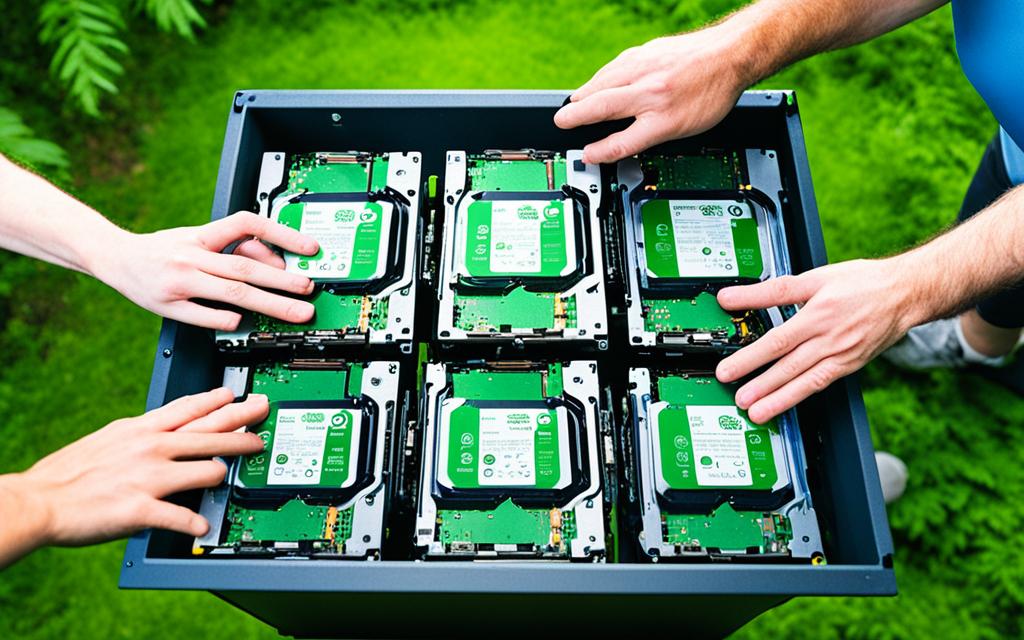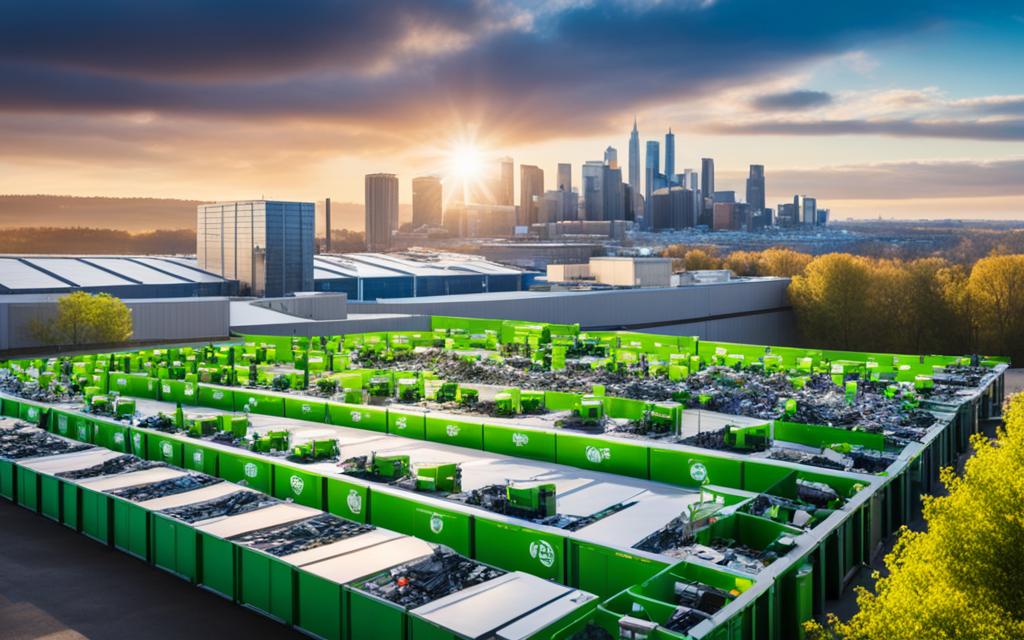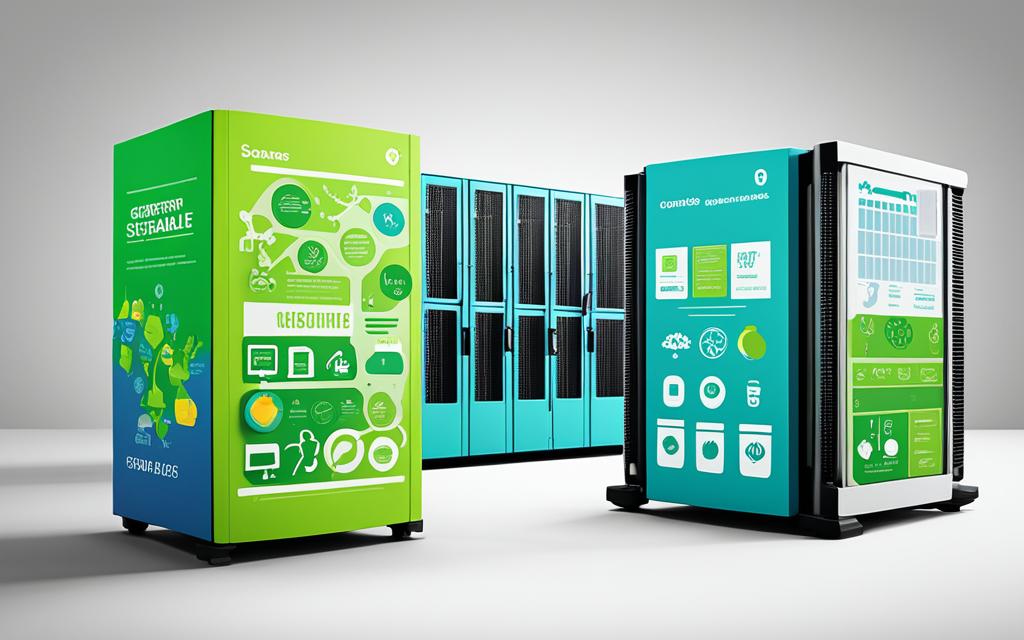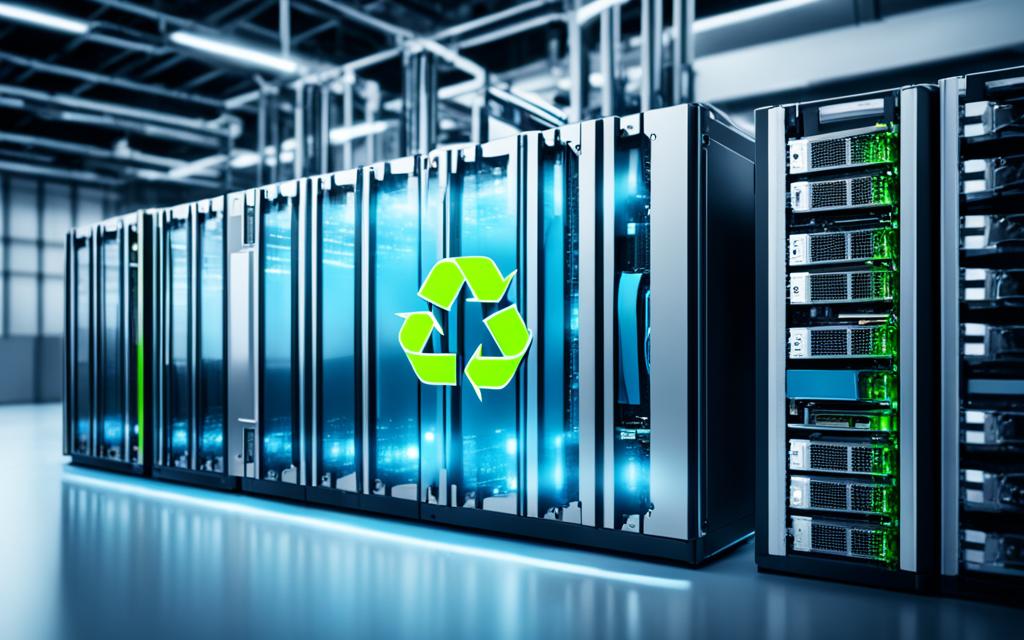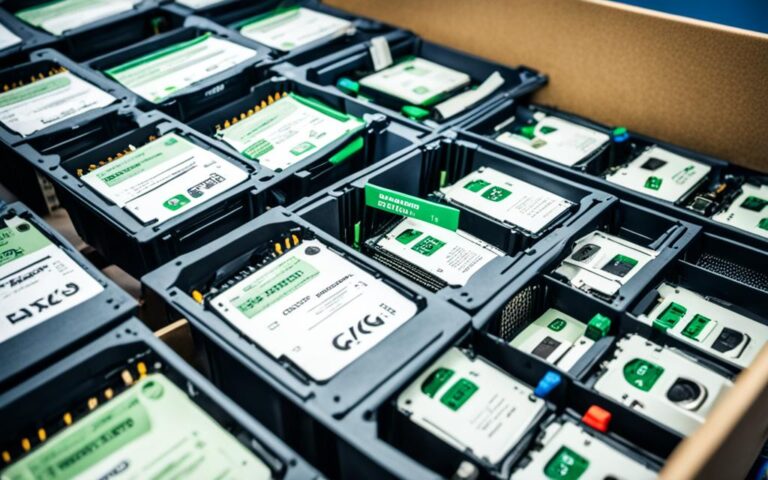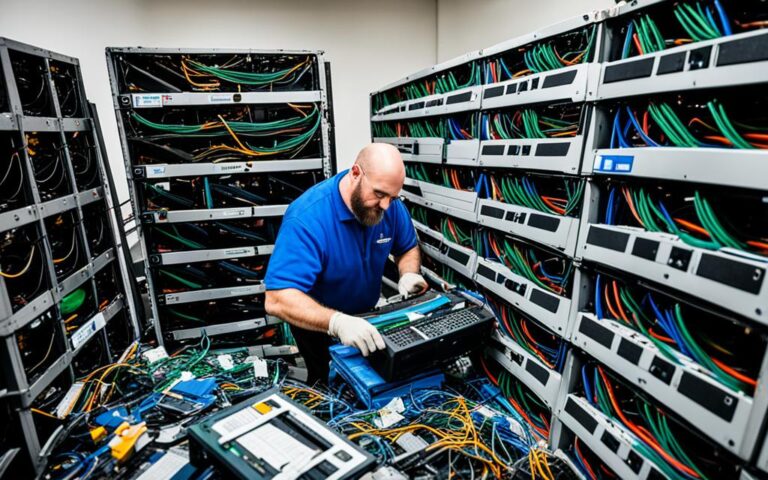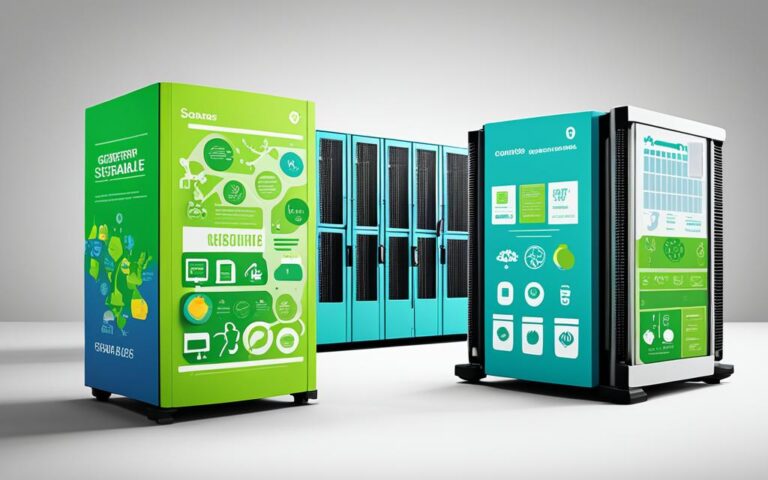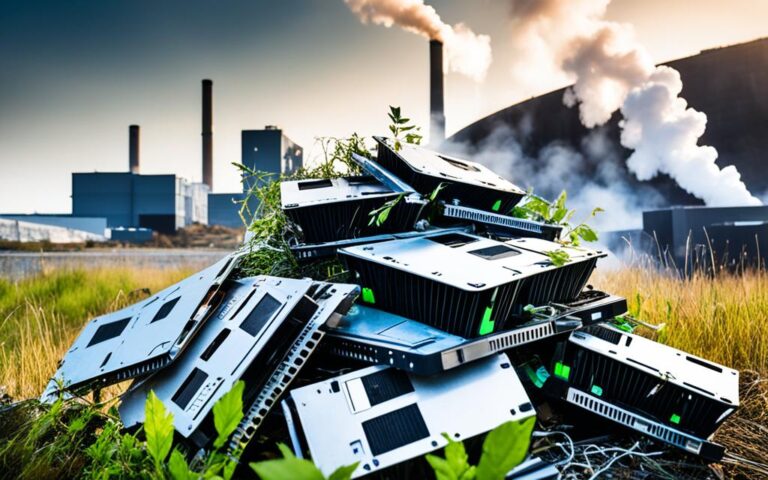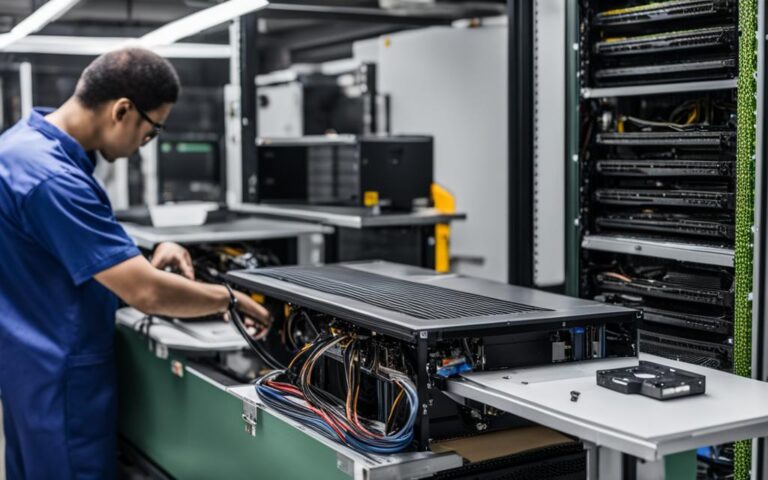How to Promote Server Recycling Within the Tech Community
In today’s rapidly evolving tech landscape, the importance of server recycling cannot be overstated. As businesses strive to stay ahead in the digital world, it is crucial to prioritize sustainable server disposal practices. By promoting server recycling within the tech community, we can make a significant impact on environmental sustainability, data security, regulatory compliance, and cost efficiency.
Properly recycling servers goes beyond just getting rid of outdated hardware. It empowers businesses to contribute to a greener future by preventing hazardous materials from entering landfills and conserving valuable natural resources. When servers are disposed of incorrectly, they can release substances like lead, mercury, and cadmium into the environment, risking pollution and harm to ecosystems.
Data security is another crucial aspect of server recycling. Retired servers may still contain sensitive information that needs to be safeguarded. Whether it’s through secure erasure or physical destruction, proper data protection measures must be implemented during the recycling process. This ensures that businesses are not exposed to the risks of data breaches or privacy violations.
Regulatory compliance is a key consideration for businesses operating in any industry. IT asset management and server recycling are subject to various regulations, and failure to comply can have severe consequences. By partnering with trusted experts like UCS Logistics, businesses can navigate the complexities of regulatory requirements and ensure that their server recycling processes align with legal obligations, environmental sustainability goals, and responsible e-waste management practices.
Server recycling also offers significant benefits in terms of optimizing IT investments and cost efficiency. Outdated or underutilized servers can take up valuable space, incur maintenance expenses, and drain financial resources. By recycling servers, businesses can free up physical space, reduce maintenance costs, and allocate resources more effectively towards technologies that drive productivity and innovation.
Inspire change within the tech community today by prioritizing sustainable server disposal practices. Let us raise awareness of the benefits of server recycling and encourage businesses to embrace responsible IT asset management. With the expertise of UCS Logistics, we can lead the way in promoting a greener future, protecting sensitive data, complying with regulations, and maximizing our IT investments.
Environmental Impact and Sustainability of Server Recycling
Server recycling is not just essential for businesses, but it also has a significant impact on the environment and promotes sustainability. By recycling servers, we can prevent hazardous materials from entering landfills and contribute to the conservation of natural resources through material recovery and reuse.
Discarded servers often contain hazardous substances such as lead, mercury, and cadmium, which pose serious risks to the environment if improperly disposed of. These hazardous materials can contaminate soil, water, and air, causing harm to ecosystems and human health.
However, by responsibly recycling servers, we can safely dispose of these hazardous materials and minimize their environmental impact. Recycling allows for the extraction of valuable components and metals from old servers, reducing the need for resource-intensive extraction and manufacturing processes.
Furthermore, recycling servers promotes the conservation of natural resources. Instead of relying solely on raw materials, recycling enables the reuse of existing materials, reducing the strain on our environment and conserving valuable resources like metals and minerals.
By adopting sustainable server recycling practices, we can effectively manage hazardous materials, minimize pollution, and preserve our natural resources for future generations.
Through server recycling, we have the power to make a positive impact on the environment and work towards a more sustainable future.
Data Security and Protection in Server Recycling
Proper data security is a crucial aspect of server recycling. When disposing of retired servers, businesses must take measures to ensure that sensitive data stored on these devices is protected. At UCS Logistics, we prioritize data security and protection throughout the server recycling process. Our stringent data destruction techniques, including secure erasure and physical destruction, are designed to safeguard information and minimize the risk of data breaches or privacy violations.
Secure erasure involves utilizing advanced software to permanently wipe data from servers, making it virtually impossible to recover. This method ensures that confidential information remains confidential and inaccessible to unauthorized individuals. In cases where erasure alone may not provide the desired level of security, physical destruction becomes necessary. Our state-of-the-art facilities employ specialized equipment to physically destroy servers, rendering them unusable and completely eliminating any remaining data.
“Data protection is not just a legal requirement; it is a responsibility that businesses must take seriously. By partnering with UCS Logistics, organizations can have peace of mind knowing that their servers are handled securely, and their data is protected throughout the recycling process.”
By entrusting your server recycling needs to UCS Logistics, you can have complete confidence in the secure handling of your servers and the protection of your valuable data. Our comprehensive approach to data security and protection ensures that all necessary precautions are taken to maintain the confidentiality and integrity of your information.
Stay tuned for the next section, where we explore the importance of regulatory compliance and industry-specific requirements in server recycling.
Regulatory Compliance and Industry-Specific Requirements in Server Recycling
Businesses operating in the tech industry must navigate a complex landscape of regulations and industry-specific requirements when it comes to IT asset management and server recycling. Failure to comply with these obligations can lead to significant consequences, including fines, penalties, and reputational damage. To ensure adherence to legal requirements, environmental sustainability goals, and responsible e-waste management practices, partnering with UCS Logistics is imperative.
With an unwavering commitment to staying current with the latest regulations and industry standards, UCS Logistics provides businesses with the expertise and support necessary to navigate the complexities of regulatory compliance. By aligning server recycling processes with legal requirements and environmental goals, UCS Logistics helps businesses mitigate potential risks and lay the foundation for responsible e-waste management.
Here are some examples of industry-specific regulations that businesses must consider:
- ISO 14001: An international standard for environmental management that provides a framework for businesses to reduce their environmental impact and improve sustainability.
- WEEE Directive: The Waste Electrical and Electronic Equipment Directive, applicable in the European Union and governing the proper disposal of electronic waste.
- GDPR: The General Data Protection Regulation, which mandates businesses to protect the privacy and personal data of EU citizens.
“Partnering with UCS Logistics ensures that businesses can confidently meet these regulations and requirements, safeguarding their operations and their commitment to environmental sustainability.”
By partnering with UCS Logistics, businesses can access comprehensive support and guidance in complying with applicable regulations. Whether it’s ensuring proper documentation, meeting reporting requirements, or implementing secure data destruction procedures, UCS Logistics helps businesses maintain regulatory compliance throughout the server recycling process.
In addition to regulatory compliance, UCS Logistics also understands the unique needs of different industries and tailors server recycling solutions accordingly. Whether it’s the healthcare sector with its stringent privacy regulations or the financial industry with its focus on data security, UCS Logistics provides industry-specific expertise for a seamless and compliant server recycling experience.
Case Study: Industry-Specific Compliance
Let’s take a closer look at how UCS Logistics assists a business in the healthcare sector with its industry-specific requirements:
| Industry | Challenge | Solution |
|---|---|---|
| Healthcare | Comply with HIPAA regulations and ensure secure disposal of servers containing sensitive patient information. | UCS Logistics provides certified data destruction services, including secure erasure and physical destruction techniques, ensuring compliance with HIPAA regulations and protecting patient data. |
“With UCS Logistics’ expertise, the healthcare organization confidently disposes of retired servers in a manner that complies with industry-specific regulations while prioritizing data security and patient privacy.”
In summary, regulatory compliance and industry-specific requirements form a crucial aspect of server recycling. UCS Logistics offers businesses the tools, knowledge, and tailored solutions needed to stay compliant and meet industry-specific obligations. By partnering with UCS Logistics, businesses can navigate the complexities of regulatory frameworks, ensure responsible e-waste management, and position themselves as champions of environmental sustainability within their respective industries.
Optimizing IT Investments and Cost Efficiency through Server Recycling
In today’s rapidly evolving digital landscape, businesses face constant pressure to optimize their IT investments and improve cost efficiency. One area that often goes overlooked is the management of outdated hardware and the associated costs it incurs. Outdated or underutilized servers not only occupy valuable physical space but also require maintenance and become significant financial burdens.
Server recycling provides a compelling solution to these challenges, enabling businesses to unlock cost-saving opportunities and allocate resources more effectively. By recycling servers, organizations can:
- Free up physical space:
- Outdated servers can take up substantial space in data centers or office environments. By recycling these servers, businesses can clear physical space and optimize their infrastructure.
- The maintenance costs associated with aging servers can quickly add up. By retiring and recycling outdated hardware, businesses can significantly reduce ongoing maintenance expenses.
- Outdated hardware may require additional power consumption, cooling, and support contracts, leading to unnecessary costs. Proper server recycling enables businesses to eliminate these expenses and redirect resources.
This optimization in IT investments and cost efficiency allows organizations to focus on technologies that drive productivity and innovation. By redirecting the financial resources saved through server recycling, businesses can invest in cutting-edge equipment, employ higher-performing technologies, and enhance operational efficiency.
Take a look at the table below to understand the potential cost savings achieved through server recycling:
| Cost Category | Potential Savings |
|---|---|
| Hardware maintenance | 30% reduction |
| Energy consumption | 25% decrease |
| Support contracts | 20% cost reduction |
| Data center space | 40% increase in available space |
| Total cost savings | Up to 35% |
Image: [server recycling image]
As illustrated in the table, businesses can achieve substantial cost savings across various categories by implementing a server recycling strategy. These savings can be reinvested strategically to drive both short-term and long-term success.
“Properly managing outdated hardware not only minimizes financial burden but also allows businesses to allocate resources for innovation and growth.”
Resource Allocation for Innovation and Growth
By optimizing IT investments and improving cost efficiency through server recycling, businesses can allocate resources for innovation and growth. The funds saved from eliminating unnecessary costs and reducing maintenance expenses can be channeled towards:
- Research and development: Investing in research and development initiatives enables businesses to stay competitive, develop new products and services, and explore market opportunities.
- Talent acquisition and training: Allocating resources to attract and retain top talent enhances workforce capabilities and promotes a culture of innovation.
- Infrastructure upgrades: Upgrading IT infrastructure with state-of-the-art equipment and technologies provides a solid foundation for digital transformation and supports future scalability.
By prioritizing server recycling and proactively managing IT assets, businesses can optimize their investments, improve cost efficiency, and pave the way for sustainable growth and innovation.
Conclusion
Server recycling plays a vital role in the tech community by promoting sustainable server disposal practices. Businesses that prioritize server recycling not only contribute to environmental sustainability but also protect sensitive data, comply with regulations, and optimize their IT investments.
Inspiring change within the tech community is crucial to encourage businesses to prioritize responsible IT asset management. By raising awareness about the benefits of server recycling, we can create a more sustainable future. UCS Logistics, with their expertise in server recycling, can help businesses lead the way in promoting sustainable server disposal practices within the tech community.
Let’s make a difference and be part of the solution. Embracing server recycling is not just an opportunity to protect the environment, but also a chance to optimize IT investments and contribute to a more sustainable tech community. Together, we can achieve a future where server recycling is a norm, and sustainable server disposal is firmly established.
FAQ
Why is server recycling important?
Server recycling is essential for several reasons. It contributes to environmental sustainability by preventing hazardous substances from entering landfills and conserving natural resources through material recovery and reuse. It also ensures proper data security, compliance with regulations, and optimization of IT investments.
What environmental impact does server recycling have?
Server recycling significantly contributes to environmental sustainability. Discarded servers often contain hazardous materials like lead, mercury, and cadmium, which can contaminate the environment if not disposed of properly. Recycling servers allows for the safe disposal of these materials and reduces the need for resource extraction and energy-intensive manufacturing processes.
How does server recycling protect sensitive data?
UCS Logistics employs stringent data destruction techniques, such as secure erasure and physical destruction, to safeguard sensitive information during server recycling. This ensures that data stored on retired servers is adequately protected and minimizes the risk of data breaches or privacy violations.
What role does server recycling play in regulatory compliance?
Businesses are subject to various regulations and industry-specific requirements related to server recycling and IT asset management. Partnering with UCS Logistics ensures that server recycling processes align with legal requirements, environmental sustainability goals, and responsible e-waste management practices, helping businesses navigate the complexities of regulatory compliance.
How does server recycling optimize IT investments and improve cost efficiency?
Outdated or underutilized servers occupy valuable space, require maintenance, and become financial burdens. By recycling servers, businesses can free up physical space, reduce maintenance expenses, and eliminate unnecessary costs associated with outdated hardware. This optimization allows organizations to allocate resources more effectively and focus on technologies that drive productivity and innovation.
How can server recycling promote sustainable server disposal practices in the tech community?
By recycling servers, businesses contribute to environmental sustainability, protect sensitive data, comply with regulations, and optimize their IT investments. Raising awareness of the benefits of server recycling and partnering with UCS Logistics can inspire change within the tech community, encouraging businesses to prioritize responsible IT asset management and sustainable server disposal practices.

